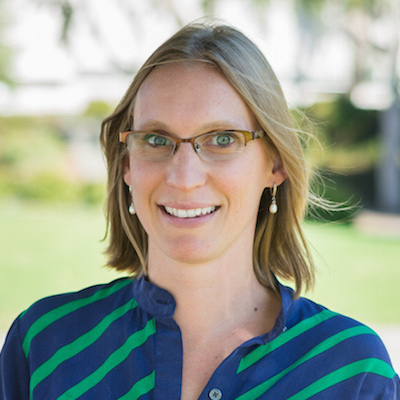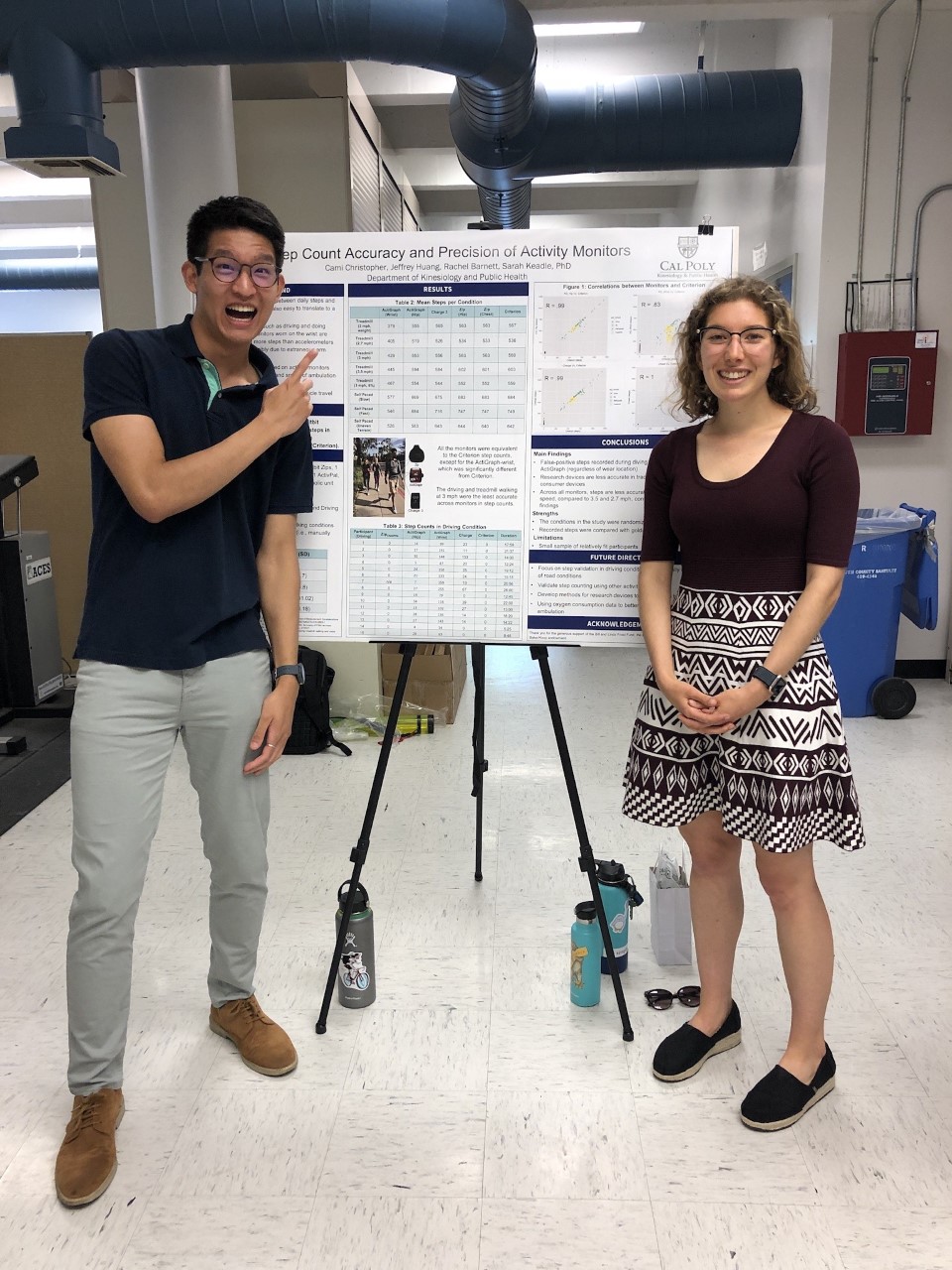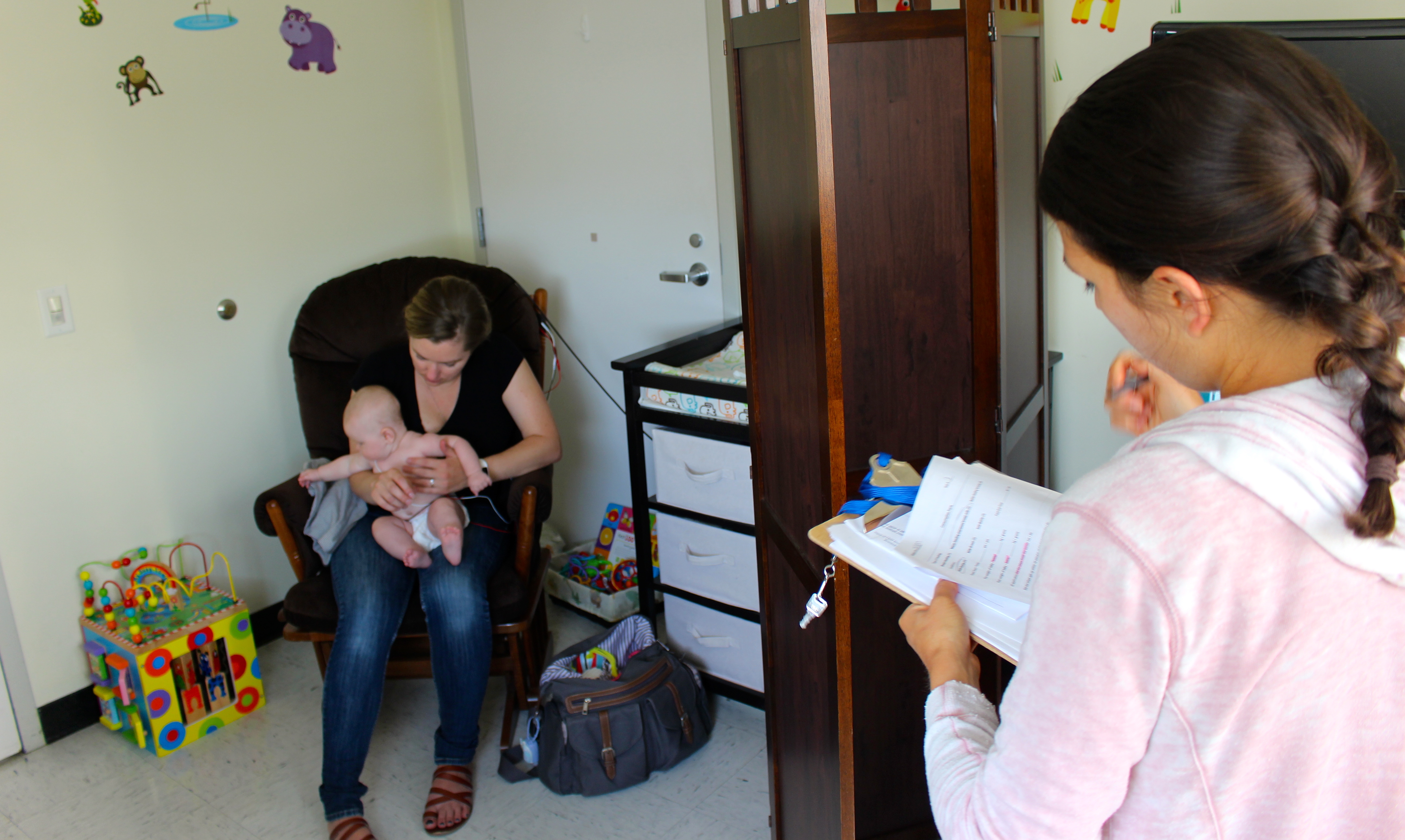Recent News

Spring 2025 Newsletter
Apr 18, 2025
We hope this newsletter finds you doing well and enjoying the additional sunlight now we’re in Spring. Center for Health Research (CHR) staff are jumping into the season with several new projects. We are excited to update you on these studies and also on ongoing research and community programs.
Featured Articles
Student Highlight: CHR Alumna Continues Research at University of North Carolina
CHR receives $10.7 grant to study effect of "food is medicine" in diabetes prevention
 CHR Researchers Highlight Northern Santa Barbara County Residents About Housing and Healthcare
CHR Researchers Highlight Northern Santa Barbara County Residents About Housing and Healthcare
Follow Us on Facebook, Instagram, and Twitter
You can now stay up-to-date with the Center for Health Research through its new Facebook, @CalPoly CHR, and instagram, @calpoly_healthresearch, accounts along with the existing Twitter account, @calpolyCHR. Be sure to follow CHR for the latest research and news.
Read more about our social media accounts ›

Spring 2024 Newsletter
May 7, 2024
We hope this newsletter finds you doing well and enjoying the additional sunlight now we’re in Spring. Center for Health Research (CHR) staff are jumping into the season with several new projects. We are excited to update you on these studies and also on ongoing research and community programs.
Featured Articles

CHR launches program to increase access for underrepresented populations in research
People of color, those with disabilities and socioeconomically disadvantaged individuals are not well represented in the research workforce. U-RISE, an NIH funded grant, is pairing college students from historically marginalized populations with research opportunities and mentorships at multiple universities, including Cal Poly. The program is led by Drs. Sarah Keadle, PhD, and Todd Hagobian, PhD, and welcomed its inaugural U-RISE class of four students this year. The hope is these students will graduate the two-year program more prepared for graduate school in the biomedical field.
Read the full article here: CHR launches new program to increase access for underrepresented populations in research

New Research at the Center for Health Research
Read more about new research at the Center for Health Research
Ongoing grant-funded research at the center
Follow Us on Facebook, Instagram, and Twitter
You can now stay up-to-date with the Center for Health Research through its new Facebook, @CalPoly CHR, and instagram, @calpoly_healthresearch, accounts along with the existing Twitter account, @calpolyCHR. Be sure to follow CHR for the latest research and news.
Read more about our social media accounts ›
2023 Winter Newsletter
Jan 11, 2023
Featured Articles

CHR to Launch New Studies in 2023
Read more about the new studies in 2023 ›

Mobile Health Unit Expands Services and Referral Programs
Preventative care for chronic diseases often seen in low-income women, mental health referrals, and more comprehensive translations for Indigenous populations are now offered on CHR’s Women’s Mobile Health Unit.

CHR Alum: Where are they now?
Each year dozens of student interns work or volunteer with CHR, helping to recruit participants, collect measures and analyze data. Many of them graduate Cal Poly and continue with public health careers.

Publications
Learn more about current CHR work by reading recent publications from investigators!
Read the full list of publications ›

Grants
Be sure to check out the grants that CHR collaborators have received this year!
Fall 2020 Newsletter
Oct 19, 2020
Featured Articles

Responding to COVID-19
The Center for Health Research (CHR) has responded to the global pandemic in a number of ways, from investigating the effects of social distancing to moving many studies online. Pictured above are Mobile Health staff and volunteers ready to safely see patients on the unit.
Read more on responding to COVID-19 ›
Follow Us on Facebook, Instagram, and Twitter

You can now stay up-to-date with the Center for Health Research through its new Facebook, @CalPoly CHR, and instagram, @calpoly_healthresearch, accounts along with the existing Twitter account, @calpolyCHR. Be sure to follow CHR for the latest research and news.
Read more about our social media accounts ›
Publications
 Investigators affiliated with the Center had a busy fall quarter.
Investigators affiliated with the Center had a busy fall quarter.
Read the full list of publications ›
Awards

Investigators affiliated with the Center for Health Research (CHR) received a number of awards.
Fall 2019 Newsletter
Oct 18, 2019
Featured Article
New Study Investigates Relationship Between BPA and Type 2 Diabetes
Cal Poly researchers hope a new American Diabetes Association grant will allow them to eventually make public health recommendations to help reduce the prevalence of type 2 diabetes.
Read more about BPA and Type 2 Diabetes
More News
Researchers Aim to Help Adults Become More Active
 Though too much sitting or lying down increases the risk of heart disease, diabetes and some cancers, sedentary screen time consumes more than half of Americans’ discretionary time outside of work and sleep. Sarah Keadle, a kinesiology and public health professor, and her colleagues hope to improve public health by determining the best ways to reduce how much time adults spend watching TV, streaming videos or engaging in other online activities.
Though too much sitting or lying down increases the risk of heart disease, diabetes and some cancers, sedentary screen time consumes more than half of Americans’ discretionary time outside of work and sleep. Sarah Keadle, a kinesiology and public health professor, and her colleagues hope to improve public health by determining the best ways to reduce how much time adults spend watching TV, streaming videos or engaging in other online activities.
Read more about Sarah Keadle and her colleagues
Fulbright Fellowship Brings Clinical Dietitian Program to Southern Africa
 Despite great need, few nutritional training opportunities exist in Africa. As a Fulbright Fellow in Malawi, Peggy Papathakis is helping to bring this important program to the country.
Despite great need, few nutritional training opportunities exist in Africa. As a Fulbright Fellow in Malawi, Peggy Papathakis is helping to bring this important program to the country.
Read more about Clinical Dietitian Program
Research Students Assess Effectiveness of Step-Tracking Devices
 Research devices are less accurate in tracking steps than consumer devices, and steps are counted less accurately at faster than slower speeds. That’s according to research conducted by kinesiology and public health majors Cami Christopher and Jeff Huang during the summer.
Research devices are less accurate in tracking steps than consumer devices, and steps are counted less accurately at faster than slower speeds. That’s according to research conducted by kinesiology and public health majors Cami Christopher and Jeff Huang during the summer.
Read more about the Step-Tracking Devices
Recent CHR Awarded Grants and Publications:
 Summary of the grants Center for Health Researchers have been awarded since January 2019.
Summary of the grants Center for Health Researchers have been awarded since January 2019.
CHR Publications
 Investigators affiliated with the Center had a busy quarter!
Investigators affiliated with the Center had a busy quarter!
Read the full list of publications
Publications Include Papers on Religion and Stimulant Use, Gestational Weight Gain
Jan 16, 2019
Investigators affiliated with the Center had a busy fall quarter, with publication topics ranging from gestational weight gain to the relationship between religious coping and the misuse of prescription stimulants. See the full list below.
Alber JM, Green SH, Glanz K. Perceived and Observed Food Environments, Eating Behaviors, and BMI. Am J Prev Med. 2018;54(3):423-429.
Alber JM, Glanz K. Does the Screening Status of Message Characters Affect Message Effects? Health Educ Behav. 2018;45(1):14-19.
Gallucci AR, Hackman C, Wilkerson A. Examining the Relationship between Religious Coping and the Misuse of Prescription Stimulants among a Sample of Undergraduate Students. Subst Use Misuse. 2018:1-9.
Phelan S, Hagobian TA, Ventura A, Brannen A, Erickson-Hatley K, Schaffner A, Munoz-Christian K, Mercado A, Tate DF. 'Ripple' effect on infant zBMI trajectory of an internet-based weight loss program for low-income postpartum women. Pediatr Obes. 2018. Epub 2018/09/19. doi: 10.1111/ijpo.12456. PubMed PMID: 30225981.
Peaceman AM, Clifton RG, Phelan S, Gallagher D, Evans M, Redman LM, Knowler WC, Joshipura K, Haire-Joshu D, Yanovski SZ, Couch KA, Drews KL, Franks PW, Klein S, Martin CK, Pi-Sunyer X, Thom EA, Van Horn L, Wing RR, Cahill AG, Group LI-MR. Lifestyle Interventions Limit Gestational Weight Gain in Women with Overweight or Obesity: LIFE-Moms Prospective Meta-Analysis. Obesity (Silver Spring). 2018;26(9):1396-404. Epub 2018/09/20. doi: 10.1002/oby.22250. PubMed PMID: 30230252; PMCID: PMC6148360.
Dodd JM, Deussen AR, O'Brien CM, Schoenaker D, Poprzeczny A, Gordon A, Phelan S. Targeting the postpartum period to promote weight loss: a systematic review and meta-analysis. Nutr Rev. 2018;76(8):639-54. Epub 2018/06/12. doi: 10.1093/nutrit/nuy024. PubMed PMID: 29889259.
Ventura AK (Ed.). (2018). Bottle-Feeding: Perceptions, Practices, and Health Outcomes. Hauppauge, NY. Nova Science Publishers.
Ventura AK, Hernandez A. Effects of opaque, weighted bottles on maternal sensitivity and infant intake during bottle-feeding. Matern Child Nutr. 2018:e12737. Epub 2018/10/23. doi: 10.1111/mcn.12737. PubMed PMID: 30345622.
Balantekin KN, Hohman EE, Adams EL, Marini ME, Ventura AK, Birch LL, Savage JS. More rapid increase in BMI from age 5-15 is associated with elevated weight status at age 24 among non-Hispanic white females. Eat Behav. 2018;31:12-7. Epub 2018/07/28. doi: 10.1016/j.eatbeh.2018.07.007. PubMed PMID: 30053676.
Tseng M, Barnoya J, Kruger S, Lachat C, Vandevijvere S, Villamor E. Disclosures of Coca-Cola funding: transparent or opaque? Public Health Nutr. 2018 Jun;21(9):1591-1593. doi: 10.1017/S1368980018000691. Epub 2018 Mar 21. PubMed PMID: 29560846.
Staff and Students Present at The Obesity Society 2018 Conference
Jan 16, 2019

Stephanie Gomez-Rubalcava (Kinesiology, '18), a research assistant, and kinesiology and public health student Kaitlin Stabbert presented their work at The Obesity Society national conference in Nashville, Tennessee, in November.
Gomez-Rubalcava's findings show that while many mothers use food to soothe their infants, this strategy was not related to excess growth in infants between the ages of six and 12 months. Gomez-Rublacava's research stemmed from her senior project.
Stabbert presented findings showing that an internet-based lifestyle intervention for postpartum women was most effective for women living in remote spaces that lacked green space.
Gomez-Rubalcava and Stabbert's research was made possible, in part, by Cal Poly Frost Research Fellowships.
Two New Staff Members Work with Participants and Their Data
Jan 16, 2019
 The Center for Health Research (CHR) now has a full-time data manager to help with creating and adapting databases for storing patient assessment and intervention information. Nickolas Katsantones, who studied computer science at Cal Poly, has been working with CHR for three years and became full-time last summer.
The Center for Health Research (CHR) now has a full-time data manager to help with creating and adapting databases for storing patient assessment and intervention information. Nickolas Katsantones, who studied computer science at Cal Poly, has been working with CHR for three years and became full-time last summer.
The tracking system he manages stores all participant data and allows staff to run retention reports and track completeness of collected data. While Katsantones is focusing on building and improving the tracking system for the Gestational Diabetes Prevention (GDP) study, he is also working on creating a template database for new studies and a community registry of people who are interested in participating in future studies.
 Jasmine Rubalcava joined the CHR team as an interventionist around the same time as Katsantones. Rubalcava, who received her bachelor’s degree in psychology from Cal Poly, is working on the GDP study, helping women who have had gestational diabetes in a past pregnancy make and track weight-loss goals. Rubalcava comes to CHR from the Family Service Agency where she worked in the public schools as a family advocate. She is currently pursuing her master’s degree to become a marriage and family therapist.
Jasmine Rubalcava joined the CHR team as an interventionist around the same time as Katsantones. Rubalcava, who received her bachelor’s degree in psychology from Cal Poly, is working on the GDP study, helping women who have had gestational diabetes in a past pregnancy make and track weight-loss goals. Rubalcava comes to CHR from the Family Service Agency where she worked in the public schools as a family advocate. She is currently pursuing her master’s degree to become a marriage and family therapist.
Investigators Receive New Grants and Begin Pilot Studies
Jan 16, 2019

Investigators affiliated with the Center for Health Research (CHR) received a number of grants to continue or begin new research projects. In addition to these funded projects, researchers have launched new pilot studies in preparation for larger grant submissions.
New Grants
See the list below for all grants and funding CHR-affiliated faculty received during fall quarter.
| PI | Project Title | Sponsor | GDO # | Amount Awarded |
|---|---|---|---|---|
| Phelan, Suzanne | Meal time interactions and risk of obesity in toddlers | DHHS - National Institutes of Health (NIH) via Temple University | 16-042 | $148,965 |
| Pilolla, Kari | Strawberries and Health in Post-Menopausal Women: Is the way to the heart through the gut? | California Strawberry Commission | 18-009 | $80,000 |
| Tseng, Marilyn | Immigrant enclaves: Conferring health advantages or creating health disparities in Chinese immigrants? | DHHS - National Institutes of Health (NIH) via Fox Chase Cancer Center | 17-477 | $68,303 |
| Ventura, Alison | A Pilot-Feasibility Study of a Home-based Intervention to Reduce Obesity Risk for Bottle-fed Infants | DHHS - National Institutes of Health (NIH) | 17-456 | $173,125 |
| Ventura, Alison | Developmental trajectories of dyadic feeding interactions during infancy and their association with rapid weight gain | DHHS - National Institutes of Health (NIH) | 17-458 | $364,380 |
| Ventura, Alison | Understanding predictors of overfeeding during infant feeding | DHHS - National Institutes of Health (NIH) | 18-119 | $69,250 |
Pilot Studies
Augmented Reality
Meaningful computer-generated images can influence people to make healthy food choices, according to a new pilot study completed by CHR faculty and students. Professors Brennan Davis in business, Jonathan Ventura in computer science and software engineering, and Suzanne Phelan in kinesiology and public health teamed up with staff and 12 students to study the choices of nearly 300 marketing students who were asked to choose between an apple and a frosted cookie.
Participants looked at the two food choices through an iPad screen that overlaid either clip art images or augmented reality (AR) images near the food. The apple was seen with images that were healthy, such as a healthy heart, and the cookie with unhealthy images, including an unhealthy heart.
Results indicated that the AR health messages were more effective than clip art images in influencing participants to choose the apple. Also, the AR images appeared most effective when they weren’t moving. Moving images may have distracted participants from associating the images with the food choices.
The study was funded by Cal Poly’s Research, Scholarly and Creative Activities Grant program (RSCA), which encourages new professors to continue research beyond the classroom. Faculty supervised student research assistants who helped the 300 participants as they viewed the images, completed a survey and made the food choice.
Virtual Reality
Research shows that lifestyle intervention programs can help promote short term weight loss, but local investigators want to know if virtual reality can help participants keep this weight off in the long term. Investigators Suzanne Phelan in kinesiology and public health, Jim Werner in art and design, and a team of staff and students hope to answer this question through a pilot study that includes traditional intervention programs paired with virtual reality.
Researchers are in the process of recruiting 24 participants with overweight or obesity. Half will randomly be placed into a program where they receive information on weight loss over five weeks through weekly group meetings. The other half will receive the same information and meetings but will also be given an iPhone virtual reality app that allows them to practice what they learned in the meetings. These five-minute virtual reality scenarios were written and created by the investigators, staff and students.
At the end of the five weeks, investigators hope to determine the feasibility of the study and whether it can be run at a larger scale.
Winter 2019 Newsletter
Jan 16, 2019
Featured Articles

Letter from the Director
Suzanne Phelan introduces a number of new initiatives for the Center and looks forward to what's to come in 2019.

New Seminar Series on Science of Health Disparities Brings Experts to Campus
A new seminar series focused on understanding race and its impact on public health will bring nationally recognized researchers and medical professionals to campus.

New Studies Aim to Give Babies Their Healthiest Possible Start
With $2 million in multiple grants from the National Institutes of Health, Alison Ventura and her students are studying how interactions between mothers and babies may affect the risk for infant overfeeding and later obesity.
More News
Mobile Health Unit Finalizes Service Hours for Patrons

The Mobile Health Unit has been providing referral services twice a week in Guadalupe and Santa Maria since November. Medical practitioners will be on site on a regular basis starting early in 2019.
Read more about the unit and see the schedule ›
Faculty Investigators Receive New Grants and Begin Pilot Studies

Investigators affiliated with the Center for Health Research (CHR) received a number of grants to continue or begin new research projects. In addition to these funded projects, researchers have launched new pilot studies in preparation for larger grant submissions.
Read more about the new grants and studies ›
Two New Staff Members Work with Participants and Their Data

The Center welcomed two new staff members: Jasmine Rubalcava, pictured at left, an interventionist and Nickolas Katsantones, a data manager.
Read more about the new staff members ›
Staff and Students Present at Recent Obesity Society Conference
 Stephanie Gomez-Rubalcava, a research assistant, and kinesiology and public health student Kaitlin Stabbert presented their work at The Obesity Society national conference in Nashville in November.
Stephanie Gomez-Rubalcava, a research assistant, and kinesiology and public health student Kaitlin Stabbert presented their work at The Obesity Society national conference in Nashville in November.
Read more about the research presented ›
Publications Include Papers on Religion and Stimulant Use, Pregnancy Weight Gain
 Investigators affiliated with the Center had a busy fall quarter, with publication topics ranging from gestational weight gain to the relationship between religious coping and the misuse of prescription stimulants.
Investigators affiliated with the Center had a busy fall quarter, with publication topics ranging from gestational weight gain to the relationship between religious coping and the misuse of prescription stimulants.
Read the full list of publications ›
Center for Health Research Reported in the New York Times and by NPR
Readers may have seen center researchers’ work in the New York Times, NPR and over national news publications during the last several months.
See a list of news articles about the Center ›










